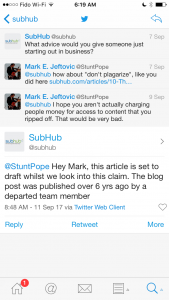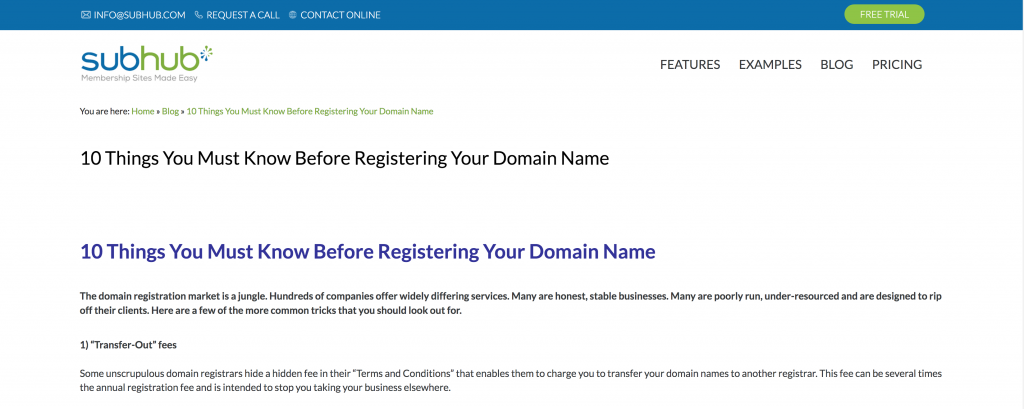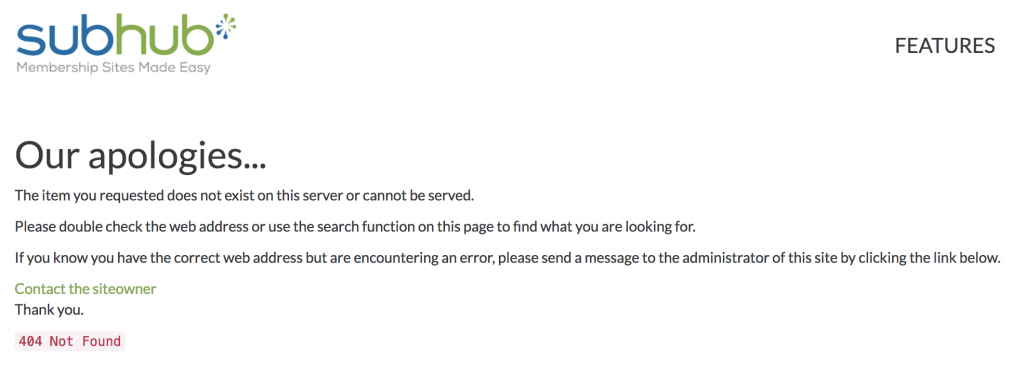Many years ago, in 2006, after listening to an audiobook called Piranha Marketing by Joe Polish and Tim Paulson, and applying what I learned therein I sat down and wrote “10 Things You Must Know Before You Register A Domain Name With Anybody” where I said
“A domain name insider speaks out and blows the lid off of the hidden “gotchas” domain registrars use to leverage your domains, your traffic and your money to their advantage. “
At the time I registered a few stand-alone domains and put it up online as a simple squeeze page at DomainWarning.com (which now just redirects to the copy we host here). Archive.org has snapshots going all the way back to the day I put it up, and in early 2007 it made Digg.com, back when Digg was a thing but that page isn’t there anymore. It is referenced in an article I wrote for CircleId back in 2007 and has been “StumbleUpon”-ed numerous times.
 This is article encapsulates the ethos of how we operate as a company: our thing has always been “we teach, not sell”. So we don’t spend money on models, monkeys and midgets and slap them together into inane Superbowl ads. We aim to educate and look out for our customers, even before they’re our customers.
This is article encapsulates the ethos of how we operate as a company: our thing has always been “we teach, not sell”. So we don’t spend money on models, monkeys and midgets and slap them together into inane Superbowl ads. We aim to educate and look out for our customers, even before they’re our customers.
This article has succeeded spectacularly in that respect. When we had it set up as a squeeze page and we tracked the conversions (with no promotion on our part), that single article has been responsible for new customers totaling in the hundreds of thousands of dollars in revenue over the years. Now it’s one of the top entry pages to our site from the search engines.
So when somebody copies it, it’s a big deal. In the past, when we’ve found parties passing that off as their own, simply bringing it to their attention is usually enough to have them take it down or at least provide attribution and a link, as stipulated in our “Terms of Use” link from the early days of the squeeze page.
When I discovered a company called “SubHub” had cosmetically rewritten this article and posted it as their own on their site, I tweeted them about it and after a day or two they gave the “somebody who doesn’t work here anymore wrote it, we’ll look into it” line, and they pulled the article.

It was surprising for me to find out now that they have republished the article and simply blocked me on twitter. “Problem solved” seems to be what they’re thinking.
The table below shows that the article structure of the two posts is identical, I’ve captured the current version of the infringing article here
| easyDNS Version | SubHub Version |
|---|---|
| 1. “Transfer-out” fees | 1) “Transfer-Out” fees |
| 2. The fine print from hell | 2) Other Small Print Nasties |
| 3. “Pay-as-you-go” | 3) You Pay, the Registrar Doesn’t |
| 4. Whois edit fees and locks | 4) Whois Edit Fees and Locks |
| 5. Premium whois privacy services | 5) Privacy Services Piracy |
| 6. Mining whois and domain slamming | 6) Domain Slamming |
| 7. The registrar-lock | 7) Domain Name Locks |
| 8. The domain auth-code | 8) Domain Name Authorisation Code |
| 9. Domain parking | 9) Domain Parking |
| 10. “Free” URL Forwarding | 10) Beware of Free Domain Name Registration |
The last one is interesting, because while on the surface it might almost look like they are talking about “free registration” vs our #10 “free URL forwarding”, the text of their item is substantively the same as ours:
Subhubs:
“There is no such thing as a free domain registration! You will be paying for something. It may be that the company is using your domain to park some names, or they may serve ‘pop-up’ or ‘pop-under’ adverts whenever somebody calls up your domain.”
Ours:
Well the low cost one often has other tricks up their sleeve for making money, either by adding your domain to their parked pool (above) or in this case, they offer “free” URL forwarding for your domain, and then sell pop-up or pop-under advertisements on your domain. You know, those things people like so much.
The entire article is like that.
It is always disappointing when somebody thinks it is fair game to simply cobble stuff they find on the internet and pass it off as their own, without attribution. It is beyond the pale that a company, once this has been brought to their attention, would address the issue by blocking the complainant on twitter and then ignoring it.
Update #1 11/07/17: SubHub doubles down (literally)
As we know SubHub simply blocked my personal Twitter account when I confronted them on the fact that they had not taken down the article after being made aware of it.
We then filed a DMCA complaint with Google to at least have the URL purged from the search index, which Google has approved and done. So their response to that seems to have been… copy the article to a new URL.
They must really like that article!
Update #2
After feigning shock and bewilderment it looks as though their pilfered version of the articles are now down, let’s hope for their sake it stays that way….



Leave a Reply